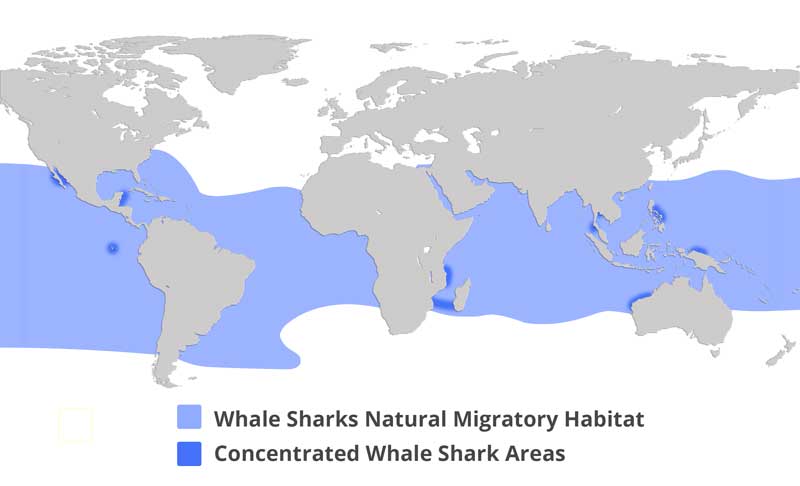Whale Shark
The Whale Shark Rhincodon typus
Species Description
- Whale sharks are the largest fish in the world
- Whale sharks can grow up to 40 feet in length
- Whale sharks can live up to 150 years
- Whale sharks are an endangered species
- Current population estimates range from 125,000-200,000 individuals
- Whale sharks are sharks and not whales
- Whale sharks have thousands of tiny teeth

Habitat and Range
- Whale sharks inhabit any water form 70-77 degrees
- Seasonally they congregate in the dark blue areas these are thought to be breeding grounds
- They migrate 1000s of miles but only at speeds of up to 3 miles per hour

Ecosystem Niche
- Whale sharks are marine filter feeders
- Whale sharks eat plankton and some small fish
- Whale sharks are limited in the size of food they can eat by their tiny teeth
- Whale sharks are top predators keeping the population of the animals they eat in check
Cause of Decline
- Whale sharks are hunted for their meat, fins, and oil
- Whale sharks are frequently victims of bycatch
- Whale sharks feeding and breeding can be interrupted by tourists
- Whale sharks like many other marine animals are vulnerable to boat strikes
Ecosystem Importance
- If whale sharks went extinct it would cause a rapid growth in zooplankton and phytoplankton numbers leading to instability in the food web.
Conservation Efforts
- It is illegal to catch whale sharks in the US and several other countries including Indonesia an important breeding ground.
- WWF is using computer image processing to document currently 458 individual whale sharks because they each have a unique spot pattern.
Geography in Whale Shark Conservation
- The WWF is using satellite tags and sonar devices to track Whale Sharks and learn more about their migration patterns.
- Understanding their movement within the ocean can allow us to better protect important areas and help whale sharks make a comeback.
How to Help
- As entanglement in fishing gear is one of the most common ways that whale sharks are killed reducing your intake of fish and seafood will lower demand for fish and seafood so less fishing will occur.
- If you own a boat the is operated in an area of high whale density reduce speed to prevent injury to the whale from a strike.
- Donate to the WWF to symbolically adopt a whale shark. The WWF is doing research to help understand whale sharks better
https://gifts.worldwildlife.org/gift-center/gifts/Species-Adoptions/Whale-Shark
- Reduce use of single use plastics to help keep our oceans clean
- As always share this information. The more people that know about the issues facing blue whales the more people that can help.
Comments
Post a Comment